#Culinary History
Text
Want to see a cool research thing? It's a collection of digitized menus from the 1800/1900s at the New York Public Library.
Perfect for my historical fiction peeps or culinary historians
300 notes
·
View notes
Text
Look what Google just recommended to me!!!!
I already own (and love) Shabbat and Portico.
But I am OBSESSED with the rest and must acquire them immediately.
Top of my list is Love Japan because LOOK AT THIS BEAUITFUL BOWL OF MATZO BALL RAMEN!!!!!
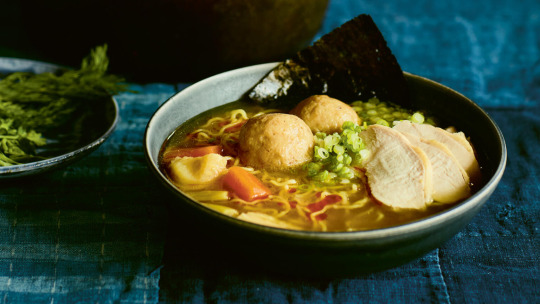
We hear a lot about Jewish people in Europe and MENA, but we do not hear a lot about Jewish culture as it blends with East Asian cultures, and that’s a shame. Not just because it erases the centuries of Jewish populations there, but also because there are plenty of people of mixed decent. People who may not have come directly from Jewish communities in East Asia, but people who have a Japanese Father and a Jewish Mother, for example. Or people in intercultural marriages. These are all real and valuable members of the Jewish community, and we should be celebrating them more. This cookbook focuses on Jewish Japanese American cuisine and I am delighted to learn more as soon as possible. The people who wrote this book run the restaurant Shalom Japan, which is the most adorable name I’ve ever heard. Everything about this book excites and delights me.
And of course, after that, I’m most interested in “Kugels and Collards” (as if you had any doubts about that after the #kugel discourse, if you were following me then).

This is actually written in conjunction with an organization of the same name devoted to preserving the food and culture of Jews in South Carolina!
I’m especially excited to read this one, because I have recently acquired the book Kosher Soul by the fantastic, inimitable Michael J. Twitty, which famously explores faith and food in African American Jewish culture. I’m excited to see how Jewish soul food and traditions in South Carolina specifically compare and contrast with Twitty’s writings.
I’m also excited for all the other books on this list!
A while ago, someone inboxed me privately to ask what I recommended for people to read in order to learn more about Jewish culture. I wrote out a long list of historical resources attempting to cover all the intricate details and historic pressure points that molded Jewish culture into what it is today. After a while I wrote back a second message that was much shorter. I said:
Actually, no. Scratch everything I just said. Read that other stuff if you want to know Jewish history.
But if you want to know Jewish culture? Cookbooks.
Read every Jewish cookbook you can find.
Even if you don’t cook, Jewish cookbooks contain our culture in a tangible form. They often explain not only the physical processes by which we make our meals, but also the culture and conditions that give rise to them. The food is often linked to specific times and places and events in diaspora. Or they explain the biblical root or the meaning behind the holidays associated with a given food.
I cannot speak for all Jews. No one can. But in my personal observation and experience—outside of actual religious tradition—food has often been the primary means of passing Jewish culture and history from generation to generation.
It is a way to commune with our ancestors. I made a recipe for chicken soup or stuffed cabbage and I know that my great grandmother and her own mother in their little Hungarian shtetl. I’ll never know the relatives of theirs who died in the Holocaust and I’ll never meet the cousins I should have had if they were allowed to live. But I can make the same food and know that their mother also made it for them. I have dishes I make that connect me to my lost ancestors in France and Mongolia and Russia and Latvia and Lithuania and, yes, Israel—where my relatives have lived continuously since the Roman occupation even after the expulsions. (They were Levites and Cohens and caretakers of synagogues and tradition and we have a pretty detailed family tree of their presence going back quite a long time. No idea how they managed to stay/hide for so long. That info is lost to history.)
I think there’s a strong tendency—aided by modern recipe bloggers—to view anything besides the actual recipe and procedures as fluff. There is an urge for many people to press “jump to recipe” and just start cooking. And I get that. We are all busy and when we want to make dinner we just want to make dinner.
But if your goal isn’t just to make dinner. If your goal is to actually develop an understanding of and empathy for Jewish people and our culture, then that’s my advice:
Read cookbooks.
#Judaism son#Jewish culture#Jewish cuisine#culinary tradition#culinary history#foodways#cultural preservation#tangible culture#jumblr#Judaism#food#cuisine#kugel discourse#Jewish joy#jewish positivity#Jews around the world#East Asian Jews
148 notes
·
View notes
Text
OMG, @netflix is about to drop the second season of High on the Hog on 11/22/23 and I can't wait...
youtube

#high on the hog#black americans#black american#soul food#black american culture#netflix#african american#black pride#black community#black excellence#black culture#black girl magic#african america history#african american cuisine#African American Culture#black history#african american history#culinary history#tv series#tv shows#Youtube
72 notes
·
View notes
Text
Citizen Cooks in the Age of Napoleon
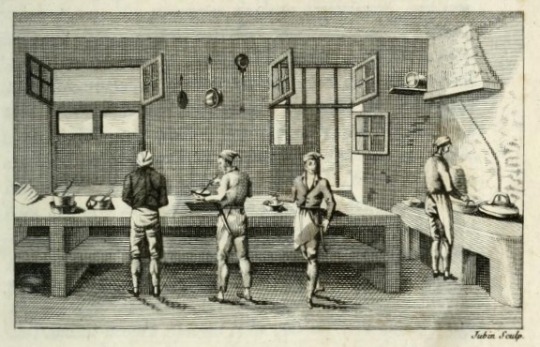
Excerpt about the role of cooks in France after the abolition of culinary guilds, and how they navigated a world which demanded for them to find new ways to stay relevant and prosperous. From Defining Culinary Authority: The Transformation of Cooking in France, 1650-1830 by Jennifer J. Davis:
French cooks sought new sites upon which to rebuild the authority of culinary labor. Throughout the early nineteenth century cooks increasingly adopted scientific terms to demonstrate their reliability and profound knowledge of the culinary arts. Such language communicated the author's education and distinction, just as an appeal to an elite patron had done in the 1660s and referral to a cook's professional expertise had done in the 1760s. The rhetoric and institutions of scientific knowledge also provided a means of distinguishing men's work from women's in the post-revolutionary era. During the early nineteenth century, cooks' claims to scientifically valuable savoir-faire rested on three crucial points of culinary innovation: food preservation, the improved production of bouillon, and gelatin extraction.
As these processes left the realm of traditional knowledge and became sites of scientific inquiry by tradespeople and amateurs alike, cooks sought to maintain authority in this arena by including scientific terms and theories in cookbooks, advertisements, and government petitions.
Two factors encouraged cooks' claims to scientific knowledge during this era. First, when Napoleon Bonaparte took the reins of government as first consul in 1799 and established himself as emperor in 1804, he raised medical doctors and academic scientists, Idéologues, to positions of political prominence. From these posts, the Idéologues subsidized experiments and inventions deemed useful to the nation and encouraged the popularization of science in the public sphere through state sponsorship of exhibitions and print forums. The Idéologues particularly supported research related to food preparation and preservation that might benefit France's armies and navies, with obvious benefits for professional cooks. Many cooks presented their particular techniques to the government during this time, seeking both financial recompense and public acclaim. Second, a voluntary association closely allied with the Idéologues' vision, the Société d'encouragement pour l'industrie nationale (Society for the Encouragement of National Industry), provided a forum in which formally trained scientists, politicians, merchants, artisans, and curious educated men might unite to address questions that inhibited French science and industry.
Together, these men sought to develop a more coherent program for industrial advancement than any one group could achieve independently. The society explicitly sought to join scientific knowledge to artisanal practical expertise, recognizing that each group had strengths that would benefit industrial development. This association invested heavily in three diffuse projects that eventually infused the most basic culinary processes with scientific awareness: new methods of food preservation to benefit the nation's armies and navies, new methods of stock preparation to sustain the nation's poor, and new methods of extracting gelatin from bones to improve hospital and military diets at little added expense.
#Illustration from L'art du Cuisinier by Antoine Beauvilliers (1814)#Defining Culinary Authority: The Transformation of Cooking in France 1650-1830#Jennifer J. Davis#David#citizen cooks#napoleon#napoleon bonaparte#napoleonic#napoleonic era#first french empire#french empire#19th century#french revolution#cooks#food#culinary history#france#1800s#history#french history#Antoine Beauvilliers#Beauvilliers#Society for the Encouragement of National Industry#Société d'encouragement pour l'industrie nationale
30 notes
·
View notes
Text
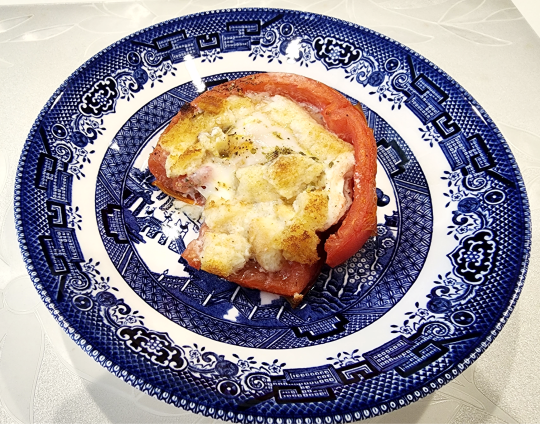
I made an authentic 1910s recipe on Armistice Day today: originally published in The Bayonne Herald and Greenview Register in 1915, and shared on Bluesky by Kristy Baxter.
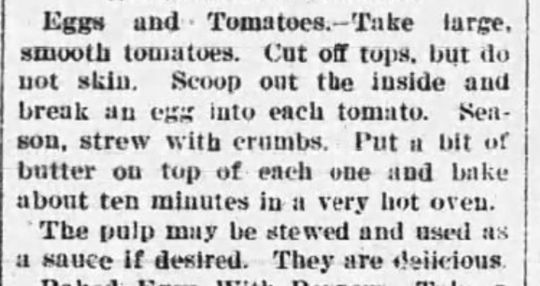
It took about 17 minutes at 450 F for gooey but not very runny eggs, adjust to your preferences. I have experimented with oven roasted tomatoes for English Breakfast, and I find that they always need more time in the oven.
For seasoning, I used salt, pepper, powdered garlic, dried herbs, and a dash of adobo seasoning. More fresh grated pepper and some parmesan cheese were excellent additions to the cooked eggs, I will definitely make 1915 Eggs in Tomatoes again.

#1910s#food#culinary history#cooking with shaun#recipe#historical cooking#great war era#1915#œuf cocotte en tomate#eggs in tomatoes#foodways#traditional recipes#described#blue willow#chinoiserie#traditional food
65 notes
·
View notes
Text
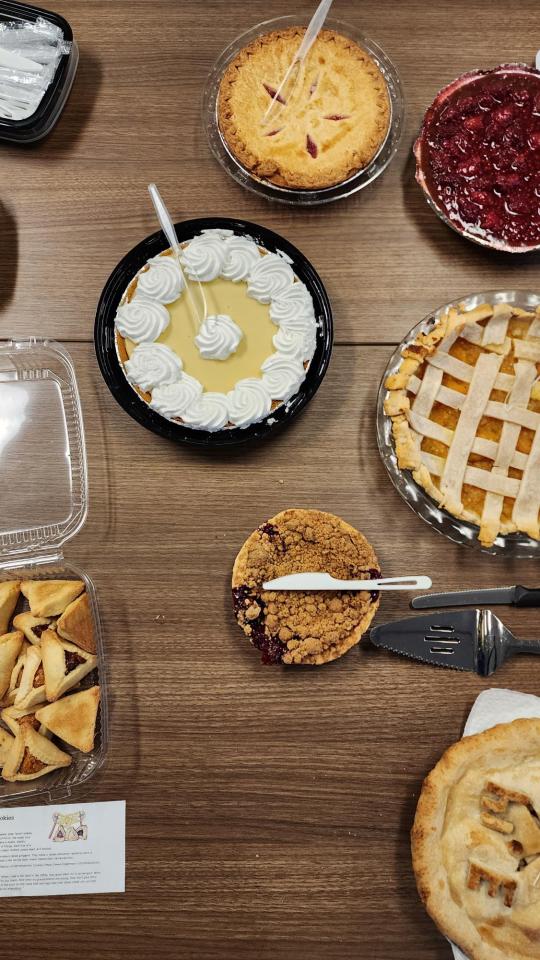

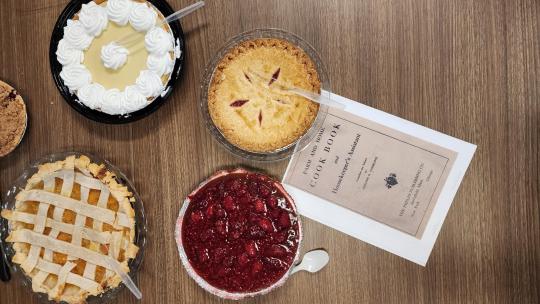
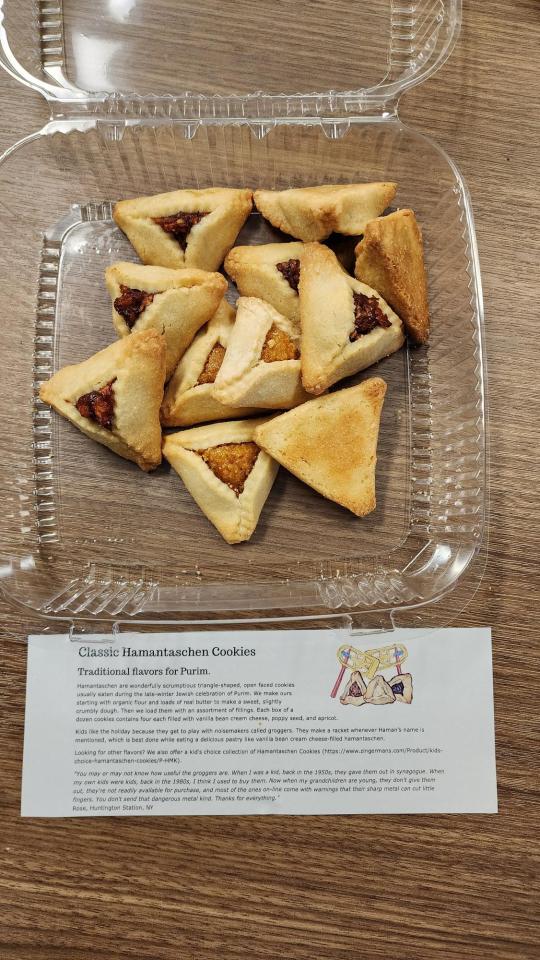
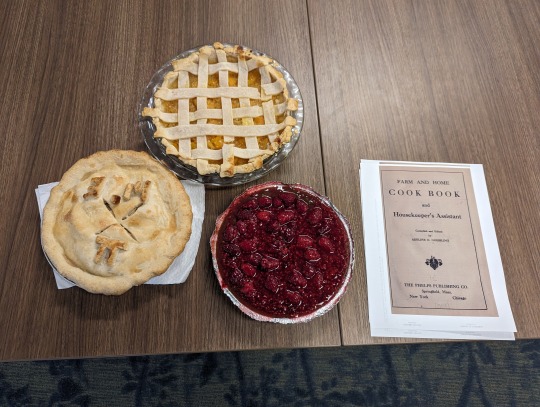
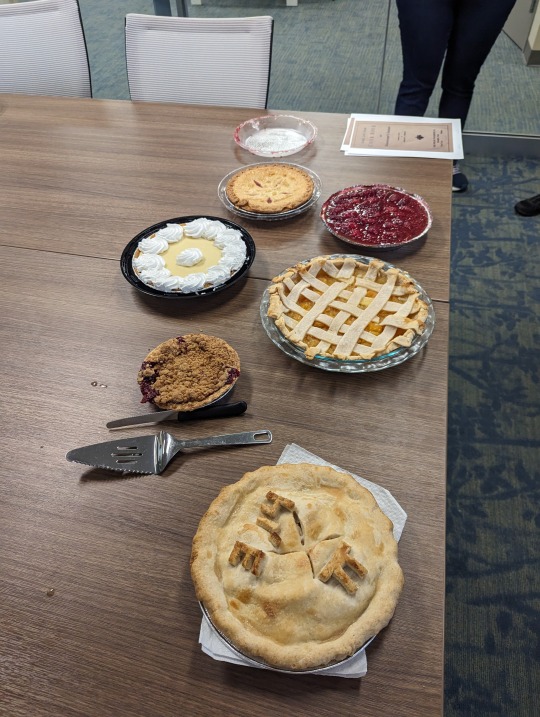
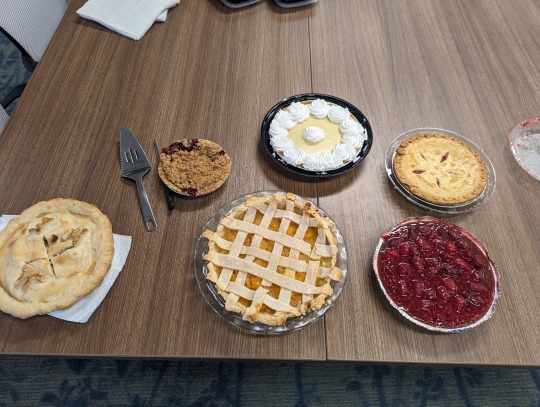
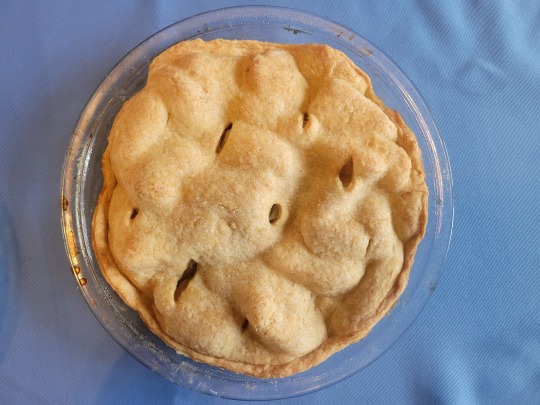
A celebration of #PiDay and #PieDay from the Great Library Bake-off! #GLPBO24!
#libraries#Pie Day#Pi Day#GLPBO24#special collections#libraries and archives#special collections and archives#special collections libraries#american culinary history#culinary history#pies#pie#bake off#pie bake#pie crust#great library pie bake off#gbbo#glpbo 2024
21 notes
·
View notes
Text
Everyday I find something else that shows how strange(?) white supremacy is in practice. Like I remember joking with my sis n law how black people especially older black people prefer butter pecan ice cream. OFC it’s somehow connected to Jim Crow. Around the country, Black people were only allowed to eat Vanilla ice cream on the 4th of July. The racists will do anything to subjugate people wtf
youtube
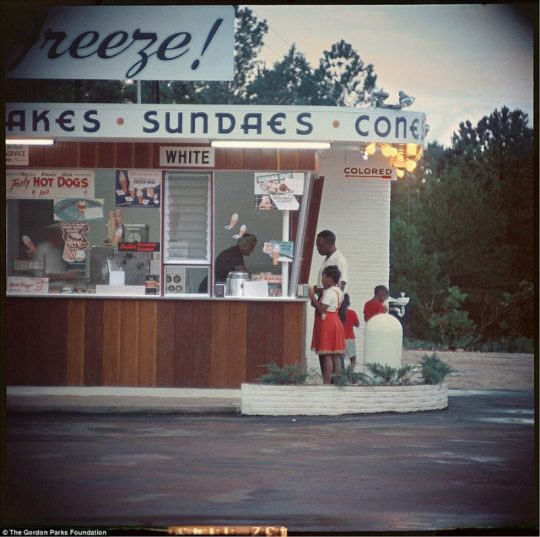
32 notes
·
View notes
Text
Y’know what’s more messed up than learning something you thought was a newer invention is actually older?
Learning something that feels so *classic* and old, and that you’re certain must have been around since forever, is actually relatively new.
Like, the chocolate chip cookie. The most classic cookie I can think of. The basic cookie.
It wasn’t invented until 1938.
(Technically recipes similar to the chocolate chip cookie existed to the Tollhouse recipe in 1938, but still.)
There’s a bunch of other examples.
It feels so weird to me, to think that there was a time before chocolate chip cookies. When my great-grandma was born, there were no chocolate chip cookies.
How can that be
#chocolate chip cookies#cookies#food#food mention#history#culinary history#sort of#shit post#shower thoughts
7 notes
·
View notes
Text
Edna Lewis
youtube
Chef and author Edna Lewis was born in 1916 in Freetown, Virginia. Lewis came to be known as the "grande dame of southern cooking" and the "mother of soul food" for her work in promoting southern cuisine. She opened a restaurant in New York City, Café Nicholson, where she cooked for luminaries such as Truman Capote, Eleanor Roosevelt, Greta Garbo, and Tennessee Williams. After she left Café Nicholson, she continued to build her reputation as a chef. Lewis wrote four books, and received nearly every major culinary industry award, including a James Beard Living Legend Award and a Lifetime Achievement Award from the International Association of Culinary Professionals.
Edna Lewis died in 2006 at the age of 89.
#chefs#cooking#southern food#southern cuisine#black women#black history#women's history#culinary history#southern history#Youtube
6 notes
·
View notes
Text
The Mongols may not have troubled many modern museum curators with their art or left fine buildings to admire but they did leave a lasting legacy in other ways. Perhaps their greatest effect on world culture was to make the first serious connections between the East and West. The Mongol Empire, the largest contiguous land empire up to that point, stretched across one-fifth of the globe and their soldiers were obliged to fight Teutonic knights at one end while at the other they faced samurai warriors, neither of which enemy had any notion of the other's existence. Hitherto, the Chinese and Europeans had each viewed the other's lands as a semi-mythical place of monsters. As ambassadors, missionaries, merchants, and travellers like Marco Polo (1254-1324) were encouraged to freely cross Asia, so contact increased, and ideas and religions were spread. Gunpowder, paper, printing, and the compass all became familiar in Europe. The Mongols spread ideas in cuisine, too, such as making their sulen (shulen) broth-come-stew a popular dish across Asia even today. There were, alas, less advantageous consequences, like the Black Death (1347-1352), first transferred from a pocket of remote China to the Black Sea and from there to Venice and the rest of Europe. In Mongolia, though, the empire is remembered fondly as a golden era and Genghis Khan, the starter of it all, continues to be honoured with regular ceremonies in the Mongolian capital of Ulaanbaatar.
— Mongol Empire - World History Encyclopedia
#mark cartwright#history#military history#warfare#politics#international relations#trade#religion#travel#technology#invention#culinary history#food and drink#disease#mongolia#mongol empire#marco polo#genghis khan#sülen#black death#bubonic plague
11 notes
·
View notes
Text
"One time when he looked at me over his menu and asked me whether I would like something like a fresh mushroom omelet or one with wild asparagus, and I mumbled in my shy ignorance that I really did not care, he put down the big information sheet and for one of the few times in my life with him, he spoke a little sharply. He said, 'You should never say that again, dear girl. It is stupid, which you are not. It implies that the attentions of your host are basically wasted on you. So make up your mind, before you open your mouth. Let him believe, even if it is a lie, that you would infinitely prefer the exotic wild asparagus to the banal mushrooms, or vice versa. Let him feel that it matters to you ... and even that he does!'
'All this,' my uncle added gently, 'may someday teach you about the art of seduction, as well as the more important art of knowing yourself.' Then he turned to the waiter and ordered two wild asparagus omelets. I wanted for a minute, I still remember, to leave the dining car and weep a little in the sooty ladies' room, but instead I stayed there and suddenly felt more secure and much wiser - always a heady experience but especially so at nineteen. And I don't believe that since then I have ever said, 'I don't care,' when I am offered a choice of any kind of food and drink. As Uncle Evans pointed out to me, I either care or I'm a dolt, and dolts should not consort with caring people."
-'Uncle Evans' from Love in a Dish by M. F. K. Fisher
#mfk fisher#mary frances kennedy fisher#culinary writing#culinary history#culinary essay#american food writing#life learning
14 notes
·
View notes
Text
'Luxury Foods' in Medieval Islamic Societies by David Waines from World Archaeology, Vol. 34, No. 3, Luxury Foods (Feb., 2003)
"We may begin with the work entitled The Meadows of Gold written by the famous historian al-Mas'udi (d. AD 956). He was born in Baghdad and died in Cairo, having, in between, travelled widely in Persia and India in addition to Iraq, Palestine and Syria. The Meadows of Gold contains a number of anecdotes related to food. One involves the Abbasid Caliph, Harun al-Rashid (d. AD 809), of 1001 Arabian Nights fame. He was invited to dine by his brother Ibrahim b. al-Mahdi (d. AD 853), a noted poet and culinary expert, of whom more later.
Harun was served a dish of what appeared to be small and delicate slices of fish arranged in the shape of a fish. When informed that the dish was made from more than 150 fish tongues, the Caliph demanded to know its price and commanded that an equivalent of 1000 silver dirhams be distributed to the poor. This was in expiation, he said, for his brother's wastefulness. Moreover, he ordered a servant to take the fish on its plate, itself an expensive item worth five times as much as the fish preparation, and give it to the first beggar he met in the street.
A second anecdote involves another Caliph, al-Mutawakkil (d. AD 861), who was relaxing one day with his courtiers and singers beside one of the many canals that traversed Baghdad. He smelled the aroma of cooking drifting from a pot being prepared by a sailor on his boat. The Caliph ordered the pot - a beef sikbaj, a sweet and sour stew dish, brought immediately to him. The Caliph sampled the stew with a piece of bread, as did his courtiers and singers, until the pot was empty. He then ordered the pot filled with 2000 dirhams and returned to the boat; the coins that did not fit into the pot were placed in a pouch and given directly to the cook. In the Caliph's judgement the dish was the best sikbaj he had ever tasted."
I found this excerpt incredibly lovely and highly recommend you check out the whole thing on JSTOR (free to access when you make an account but also on scihub). Doing a short article review on it for my Global Connections module - covering Islamic history briefly has really touched me especially when I covered it quite begrudgingly as a child/pre-teen through Saturday-Sunday school. It was always a tug of war with my mother to make me go until at 16 I finally just refused outright and there was nothing she could do.
Admittedly out of all the classes taught at the mosque Tahrikh and Seerah always engaged me. I'm glad I can revisit it with a warm heart and with no expectation to be something I'm not so I can love share and appreciate it with fresh eyes.
#palestine#palestinian history#arab history#history#medieval history#islamic history#islam#iran#iraq#india#syrian history#syria#iranian history#indian history#sikbaj#food history#culinary#culinary history#world trade#global trade#medieval trade#spice trade#pbuh#university#london#hospitality#islamic empire#jstor#history of food
2 notes
·
View notes
Note
Hello Eden (is it okay to call you that?)
Do you have any current favourite songs? What kind of music do you generally listen to?
And do you have any favourite books? What kind of books do you like to read?
If you are okay with sharing, no pressure.
Sending you love and strength ❤️
Ah!!! Thanks for this ask @sunnenfinster! What a lovely change of pace.
Eden is fine!!!!!
Ok, so I love music and books!
Of all broad genres of entertainment media, music is probably what I follow least closely. It’s not that I don’t like it; I just am always behind the curve in my tastes. I love listening to most confessional singer/songwriters. I love folk, rock, pop, and rap. I also get a lot of music I like from the background of media like TV, Movies, and podcasts. In general, I love confessional singer-songwriters from any genre.
Fave singers (and the albums I’d recommend from them: songs I’d recommend from that album [notes]):
Jem (Finally Woken: Come on Closer, Falling for You, Just a Ride). All songs on this album rock, to me.
Sheryl Crow (Sheryl Crow: A Change Would Do You Good, [about choosing love over anger and stopping gun violence], Redemption Day [about the Bosnian war], Maybe Angels [could be about aliens or being in a cult idk but it’s a good song about misplaced belief] I love every song on this album tbh. Wall-to-wall bangers.
Missy Elliot (Under Construction: Gossip Folks, Work it)
Suzanne Vega (99.9 F: 99.9 F, Blood Makes Noise, Rock in the Pocket, When Heroes Go Down)
Artists and songs I like in general: Aimee Mann (her voice is like butter and I could listen to her sing forever); Eliza Rickman: Pretty Little Head; Sims: Icarus; Dessa: Call Off Your Ghost; Sifu Hotman: Matches (I know no other songs by this artist but I LOVE this one so much. I’m gonna go listen to it right now); Lorde: Yellow Flicker Beat; Björk: Human Behavior; G Flip: Hyperfine, Gay 4 Me, Killing My Time; Aimee Mann: That’s Just What You Are [I love Aimee’s voice and could listen to her sing the phone book. All songs off her Magnolia Album are amazing too]
And gosh. So many more…
As for books!!!! OMG! I love books so much. I love so many different kinds of books. Some fave genres include: Classic Lit, Magical Realism, Sci-fi/Fantasy/Speculative Fiction; Engaging YA Series, Historical Fiction; Culinary History and Analysis; and Mythological Retellings
Classic Lit Faves:
“To The Lighthouse” by Virginia Woolf [This contains my fave quote in all of literature. This could also never be adequately adapted into a movie. It’s a fascinating look into how people think and how we all process internal thoughts. Must be comfortable with long sentences, semicolons, and allowing sentence clauses to wash over you like ocean waves in order to enjoy this book]
“Cider with Rosie” by Laurie Lee
“All Quiet on the Western Front” by Erich Maria Remarque
“The Portable Dorothy Parker” by Dorothy Parker
“The Odyssey” by Homer, translated by Emily Wilson
“The Iliad” by Homer — both Emily Wilson’s Translation and Stanley Lombardo’s Translation
Magical Realism
“The House of the Spirits” by Isabelle Allende
“Aunt Julia and the Scriptwriter” by Mario Vargas Llosa
“Bless Me Última” by Rudolfo Anaya
“Like Water for Chocolate” by Laura Esquivel
SFF Faves:
“An Absolutely Remarkable Thing” and “A Beautifully Foolish Endeavor” by Hank Green
“The Martian” by Andy Weir
The Tiffany Aching line of the Discworld Series by Terry Pratchett (“The Wee Free Men,” “I Shall Wear Midnight,” “A Hat Full of Sky,” and “Wintersmith”)
“The Locked Tomb” Series by Tamsyn Muir (“Gideon the Ninth,” “Harrow the Ninth,” “Nona the Ninth” so far)
Engaging YA
“The Hunger Games” Trilogy by Suzanne Collins
“Grishaverse” Series by Leigh Bardugo
“Shadow and Bone Triogy” (related to the Grishaverse) by Leigh Bardugo [note: I didn’t know until making this list that Leigh Bardugo is an Israeli Jew! Very cool]
Historical Fiction:
“Fried Green Tomatoes at the Whistlestop Cafe” by Fannie Flagg [the associated cookbook is very good. Also, you’ll never eat ribs the same again]
“Tracks” by Louise Erdrich [one of the most interestingly written books I’ve ever read. Has two dueling narrators. This is part of a series of books but can be read as a standalone]
Culinary Analysis History
Bree Wilson’s books (“First Bite: How We Learn to Eat,” “Consider the Fork,” and “The Way We Eat Now,” specifically) are some of the best out there. [I didn’t realize until a couple weeks ago that Bee Wilson and the classicist translator Emily Wilson are sisters! They are both extremely smart, engaging writers.]
“Omnivore’s Dilemma” by Michael Pollan
“An Edible History of Humanity” by Tom Standage
“Food: A Cultural Culinary History” by Ken Albala (this one is a Great Courses course, so not technically a book. But it’s available most places you can get audiobooks. And it’s what got me fascinated with this subject)
Mythological Retellings
“Circe” and “The Song of Achilles by Madeline Miller
“The Silence of the Girls” and “The Women of Troy” by Pat Barker [TW Rape]
“Norse Mythology” by Neil Gaiman
Genre Defy-ers
(These are some of my All Time Faves that can’t really be confined to any genre)
The “Outlander” Series by Diana Gabaldon [and the related “Lord John” Series by the same author] (TW: for Rape)
“The Anthropocene Reviewed” by John Green
Just Finished Reading
“Breakfast at Tiffany’s” by Truman Capote (Wow it was so good. I haven’t seen the movie in a while but I seriously doubt they adapted it faithfully. It was so surprising!!!)
Currently Reading
“Murder on the Orient Express” by Agatha Christie
Selections From My To Be Read List
“The City of Brass” by S.A. Chakraborty
“Lessons in Chemistry” by Bonnie Garmus
“The Source” by James Michener
“The Secret of Cooking” by Bee Wilson
“Equal Rites” by Terry Pratchett
“A Time Traveler’s Guide to Medieval England” by Ian Mortimer
“What You Are Looking For Is In The Library” by Michiko Aoyama
“The Doomsday Book” by Connie Willis
I also love to read cookbooks from various cultures to gain insight into those cultures in a very tactile way.
Sending you love and gratitude! 💜💜💜💜
I’m always down to discuss books!
#about me#books#lit#book Recs#culinary history#historical fiction#YA#Classic Lit#Queer Lit#book worm#reading#reader#mythological Retellings#ask me stuff
11 notes
·
View notes
Text
Lakka
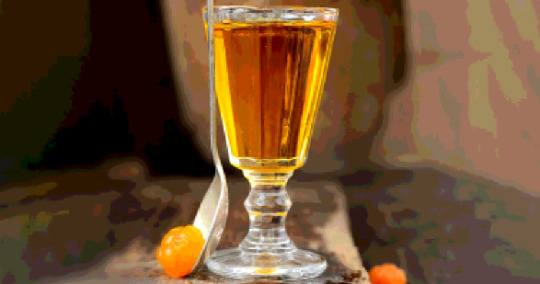
This exotic liqueur is made from the fermentation of the cloudberry fruit. The fruits are soaked in a neutral grain alcohol over several months, then sweeteners and spices are added for flavour accentuation. Due to the fruit's scarcity, the number of lakka distributors follows suit, all being based in Finland, giving many foreigners a motive to visit and discover the liquid gold buried deep within the land.
#cooking#culinary history#food history#sweden#norway#scandinavian food#cloudberry#lakka#chef#kitchen
2 notes
·
View notes
Text
Napoleon and Nicolas Appert: The invention of canned food
“Although he [Napoleon] continued so far as possible the Revolutionary practice of having armies live off the land, he also did his best to develop an efficient commissariat. A famous part of his supply system was canned food, particularly meat, for the army. Nicholas Appert had started the food-canning industry in 1804, building a factory that employed fifty people. His method prescribed putting the food in glass jars, which were next carefully stoppered, and then cooked in boiling water for lengths of time varying with the type of food. The navy first used the canned food, with great success even on extended cruises. In 1810 the Minister of the Interior awarded Appert 12,000 francs on condition he make his process public.”
— Robert B. Holtman, The Napoleonic Revolution
The inventor of canning, Appert, deposited samples of his invention to the imperial government in 1809, specifically to the Society for the Encouragement of National Industry [Société d'Encouragement pour l'Industrie Nationale].
He published his findings in 1810, titled: Le livre de tous les ménages ou l'art de conserver pendant plusieurs années toutes les substances animales et végétales [English tr: The Art of Preserving All Kinds of Animal and Vegetable Substances For Several Years]. It was “a work published by the order of the French Minister of the Interior, on the report of the Board of Arts and Manufactures”.
For his discovery, the government paid him 12,000 francs and gave him free lodgings and a workshop in the Hospice des Quinze-Vingts. Every prefecture in the French Empire was supplied with a copy of his book, and the prefects were assigned the responsibility of disseminating the information widely. Two more editions were created under the empire, and another in 1831.
His factories were ransacked and destroyed during the invasions of France in 1814 and again in 1815. He was able to rebuild and won several gold medals from the Society for the Encouragement of National Industry and eventually became a member of the Society.
Appert is quoted as saying “I sacrificed everything for humanity, all my life”.
Additional Sources:
English translation of Appert’s 1810 publication
Nicolas Appert inventeur et humaniste, Jean-Paul Barbier, 1994 (Fondation Napoléon)
Collection A. Carême: Le conservateur 1842 (archive.org)
Defining Culinary Authority: The Transformation of Cooking in France, 1650-1830 by Jennifer J. Davis
#he’s my hero 😭#Nicolas Appert#Appert#Napoleon#napoleon bonaparte#canned food#Robert B. Holtman#Holtman#the Napoleonic revolution#napoleonic era#napoleonic#canned#canning#first french empire#french empire#19th century#history#Jean-Paul Barbier#Barbier#culinary history#french history#napoleonic wars#coalition wars#1800s#food#food history#gastronomy#Napoleonic reforms#reforms#Napoleon’s reforms
20 notes
·
View notes
Text
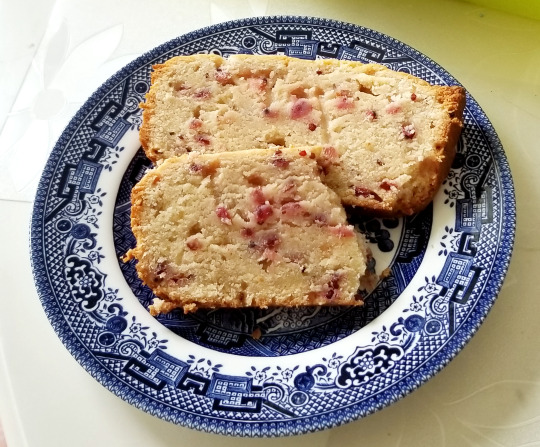
Also this afternoon: slices of "A Fine Cake" with currants from The Fort George Bill of Fare by Amanda M. Gamble, which is adapted from a recipe in A New System of Domestic Cookery (originally published 1806).
The modern recipe is considerably simplified, but it's from a related family of rich, heavy cakes with no leavening agents that need to be baked and baked. I forgot this one in the oven and it was still just barely done. The texture is like cupcakes, buttery and crumbly.
#cooking with shaun#food#recipes#the fort george bill of fare#currant cake#culinary history#it has no spices just butter sugar flour fruits#i would like to think the men of fort george had a nice cake now and then#eta: it also contains eggs
48 notes
·
View notes